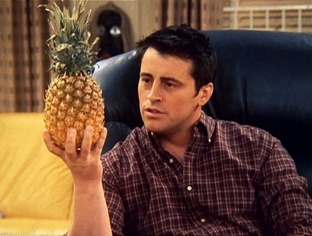Want to make sure your pilot is better than the competition? Discover the important differences between good and bad pilots below...
KEEP READING FOR MORE...
What's So Bad About "Friends"?
Six good looking twenty somethings living in a way too nice apartment in a non-descript New York.
People loved it. That's obvious.
The problem is, writers have failed to realize that the template for "Friends" could only work once. And when they do use the template, they take the 'eh' and leave the brilliance behind.
You see it every pilot season, and the results just keep getting worse.
There are clear reasons why these "Friends" knock-offs fail. In fact, there are quite a few things that almost every bad sitcom has in common.
The good shows have a lot in common too.
I know, because over the last few weeks Chelsea and I have watched hundreds of pilots. We studied them, took notes on them, and compared the great with the "Happily Divorced."
This post is a result of all those hours spent in front of our TV, 22 minutes at a time.
It's the definitive good vs. bad list on how to write the original sitcom that will get you work...
Here's the List:
Bad pilots open with an information dump.
Good pilots use setting to define character.
Bad pilots could take place anywhere, with anyone.
Good pilots live in the present.
Bad pilots dwell in the past.
Good pilots start with a memorable image.
Bad pilots start in an apartment in any major American city.
Good pilots use at least one character just for comic relief.
Bad pilots don't embrace the dumb guy.
Good pilots optimize location.
Bad pilots don't even define location.
Good pilots have rhythm.
Bad pilots stop and start and stutter.
Good pilots have inherent conflict.
Bad pilots rely on outside sources for conflict.
Good pilots let actions speak for themselves.
Bad pilots talk about what's happening on screen.
Good pilots have tons of potential for romantic twists and turns.
Bad pilots don't address potential romance.
Good pilots use fresh, new story telling devices.
Bad pilots repeat what's been done before.
Good pilots use cause and effect.
Bad pilots are a series of loosely related scenes.
Good pilots are built for longevity.
Bad pilots don't look far enough in the future.
Good pilots start with a joke.
Bad pilots put story ahead of comedy.
Good pilots emphasize routine.
Bad pilots are people sitting and talking.
Good pilots are about characters.
Bad pilots are about gimmicks.
Good pilots have characters that make assumptions.
Bad pilots have characters that state facts.
What Do You Have to Add?
Or tell us we're wrong and 100 Questions is actually amazing. Either way - - comment now.
If you haven't signed up to our email list, sign up now. You'll get weekly updates, exclusive content and all the information you need to break out in the screenwriting world.

